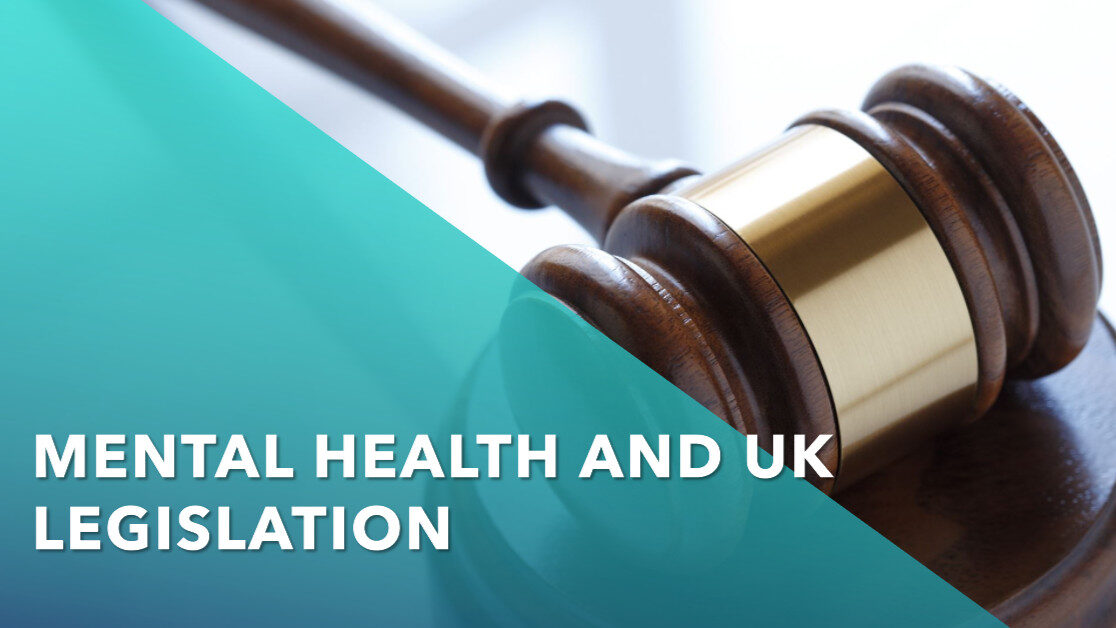When you hear the term “mental health legislation,” what comes to mind? Is it protection? Restriction? Or perhaps a confusing maze of legal jargon that feels impossible to navigate?
Mental health laws in the UK are not just words in dusty legal documents; they are the backbone of how society protects, supports, and empowers individuals experiencing mental health challenges. Understanding these laws is not just important; it is vital for creating workplaces, homes, and communities where mental health is treated with the respect it deserves.
This post is an optional addition to my Mental Health Blog series, designed to provide readers with a broad understanding of UK mental health legislation as it stands today (February 2025). While it may not carry the emotional depth of some of the other posts, its value lies in arming you with relevant information that directly impacts the lives of individuals, families, and organisations.
However, I must begin with a critical disclaimer:
I am not a legislative expert or legal professional. The content in this post is based on me spending 9 evenings throughout January 2025, reading and gathering notes so at least my understanding is relevant and verified to be accurate up to the last published date of any referenced legislation or resource.
If you are seeking to take action based on any of the information in this post, whether as an employer, an advocate, or someone seeking support, it is essential that you consult a qualified legal professional, such as a solicitor, for guidance. Mental health law is complex, and its implications can vary depending on circumstances. A professional review will ensure that your steps and actions are not only effective but legally binding. Ok so enough of the disclaimer words and onwards with the post.
Mental health legislation in the UK serves as a shield and a compass. It shields individuals by ensuring protection against discrimination, neglect, or harm, while simultaneously guiding employers, caregivers, and communities toward building environments that embrace mental well-being. In this post, I will walk through the foundational pieces of legislation, recent reforms, and practical steps for navigating these laws. Whether you are an employee, employer, family member, or mental health advocate, this information will empower you to take action and make a difference.

Laws can often feel distant and intimidating, but they are ultimately written to protect and empower.
This post seeks to demystify mental health legislation, making it accessible and relevant for everyone. Whether you’re here out of professional curiosity, personal necessity, or a desire to advocate for others, my hope is that this introduction encourages you to explore further and take meaningful action.
Let us begin this journey into the landscape of UK mental health legislation, where knowledge becomes power, and understanding becomes a tool for positive change.
Foundational Mental Health Legislation
Understanding the core legislation governing mental health in the UK is essential for individuals, employers, and communities. These laws define the rights of individuals and the responsibilities of organisations, aiming to protect, support, and empower those experiencing mental health challenges.
Below is an overview of a key legislation, each accompanied by a direct link to its official text and the Latest Official Publication Date of the information.
The Mental Health Act 1983

- Purpose and Scope: The Mental Health Act 1983 provides the legal framework for the assessment, treatment, and rights of individuals with mental health disorders in England and Wales. It outlines the circumstances under which a person can be detained and treated without their consent, commonly referred to as being “sectioned.”
- Key Provisions: Allows for the compulsory detention and treatment of individuals deemed to have a mental disorder and who pose a risk to themselves or others. Establishes procedures for admission to the hospital, guardianship, and community treatment orders. Provides safeguards to protect patients’ rights, including the right to appeal detention and the requirement for regular reviews.
- Impact on Individuals and Employers: Employers should be aware of the provisions of the Act, as employees may be detained under its sections. It is essential to handle such situations with sensitivity, ensuring that the rights of the individual are respected and that appropriate support is provided upon their return to work.
- Official Text and Latest Official Publication Date: Mental Health Act 1983: https://www.legislation.gov.uk/ukpga/1983/20/contents – Latest Official Publication Date: 18 July 2024 (Ongoing updates are in progress)
The Mental Capacity Act 2005

- Purpose and Scope: The Mental Capacity Act 2005 establishes a framework for making decisions on behalf of individuals aged 16 and over who lack the capacity to make specific decisions themselves. It applies in England and Wales and emphasizes supporting individuals to make their own decisions wherever possible.
- Key Provisions: Defines the criteria for assessing whether a person lacks capacity. Introduces the concept of “best interests” to guide decision-making on behalf of those lacking capacity. Allows individuals to plan for a time when they may lack capacity through mechanisms like Lasting Powers of Attorney. Establishes the Court of Protection to oversee issues related to individuals lacking capacity.
- Impact on Care and Advocacy: This Act is particularly relevant in situations where individuals may be unable to make decisions due to mental health conditions. Employers and caregivers must ensure that any decisions made on behalf of such individuals are in their best interests and comply with the Act’s provisions.
- Official Text and Latest Official Publication Date: Mental Capacity Act 2005: https://www.legislation.gov.uk/ukpga/2005/9/contents – Latest Official Publication Date: 4 April 2023 (Ongoing updates are in progress)
Please note: The information provided here is accurate as of the latest official publication dates mentioned above. For the most current legal information, always refer to the latest official publications or consult a legal professional.
Workplace Mental Health Obligations
Mental health does not stop at the workplace door. For many employees, the workplace is where mental health challenges first surface, are worsened, or, with the right support, are managed effectively. In the UK, employers have significant legal responsibilities to protect and support the mental health of their employees. These obligations are not optional; they are embedded in law, reflecting the critical role workplaces play in promoting mental well-being and addressing mental health issues.
In this section, I explore the key workplace obligations for employers under UK legislation, illustrating how these legal frameworks help create safer, more inclusive environments for all employees.
Legal Obligations for Employers
Duty of Care: The Health and Safety at Work etc. Act 1974

- Purpose: This Act places a legal duty on employers to ensure the health, safety, and welfare of their employees, including their mental health.
- Key Requirements: Conduct risk assessments to identify hazards, including workplace stress and other mental health risks. Implement measures to reduce identified risks, such as stress management programmes or mental health policies. Provide training and information to employees to support mental health awareness and well-being.
- Relevance: Employers who neglect their duty of care risk enforcement action by the Health and Safety Executive (HSE), as well as reputational and financial damage.
- Resources: Health and Safety Executive – Work-related stress: https://www.hse.gov.uk/stress/index.htm– Latest Official Publication Date: 7 February 2023 (Ongoing updates are in progress)
Protection Against Discrimination: The Equality Act 2010

- Purpose: The Equality Act 2010 protects individuals with mental health conditions from discrimination in the workplace. It mandates equal treatment and prohibits unfavourable treatment based on disability, including mental health.
- Key Requirements: Employers must make reasonable adjustments to accommodate employees with mental health conditions. Examples include flexible working hours, adjusted workloads, or additional support resources. Employers must not discriminate in hiring, promotion, or disciplinary actions based on mental health.
- Relevance: Failure to comply with the Equality Act can lead to employment tribunals and significant penalties.
- Resources: Equality and Human Rights Commission – Equality Act Guidance: https://www.equalityhumanrights.com/en/advice-and-guidance/equality-act-guidance – Latest Official Publication Date: 8 April 2010 (No ongoing updates)
Confidentiality and Data Protection: General Data Protection Regulation (GDPR)

- Purpose: GDPR regulates the handling of sensitive personal data, including information about employees’ mental health. Employers must ensure strict confidentiality and secure processing of such data.
- Key Requirements: Employers must obtain explicit consent before collecting or processing mental health-related information. Employers must securely store and limit access to sensitive data. Breaches of confidentiality or mishandling of data can result in substantial fines and loss of employee trust.
- Relevance: Creating a culture of trust around mental health begins with ensuring that sensitive information is handled ethically and securely.
- Resources: Information Commissioner’s Office – GDPR Guidance: https://ico.org.uk/for-organisations/guide-to-data-protection/ – Latest Official Publication Date: 25 May 2018 (Ongoing updates are in progress)
Please note: The information provided here is accurate as of the latest official publication dates mentioned above. For the most current legal information, always refer to the latest official publications or consult a legal professional.
Practical Steps for Employers
Employers can take proactive measures to meet their obligations while creating a culture that prioritises mental health:
- Conduct Regular Risk Assessments: Evaluate workplace practices, identify stressors, and implement targeted interventions.
- Develop Mental Health Policies: Create clear guidelines outlining support systems, reporting processes, and employee rights.
- Offer Training: Provide mental health first aid training to managers and employees, equipping them to support colleagues effectively.
- Foster Open Communication: Encourage dialogue about mental health, normalising conversations and reducing stigma.
Workplace mental health obligations are not just legal requirements; they are moral imperatives. By meeting these responsibilities, employers build environments where employees feel safe, supported, and empowered to thrive. Neglecting these obligations risks legal consequences, but more importantly, it risks losing the trust and well-being of the workforce.
Recent Reforms and Proposed Changes
Mental health legislation in the UK is not static; it evolves to reflect society changes, medical advancements, and shifting priorities in care and rights. Over the past few years, significant reforms and proposed changes have shaped the legal landscape, aiming to modernise existing frameworks and ensure fairness, dignity, and improved outcomes for individuals experiencing mental health challenges.

Below I talk about several key recent reforms, such as amendments to established legislation, and highlight proposed changes that are shaping the future of mental health law in the UK.
The Mental Health Act 1983 Reform
- Overview: The Mental Health Act 1983 is undergoing significant reforms aimed at modernising the Act to better reflect patient autonomy and ensure fairness in treatment processes. The reform process began following the publication of the Independent Review of the Mental Health Act in 2018.
- Key Proposed Changes: Introducing statutory care and treatment plans tailored to individual needs. Ending the use of police and prison cells for people experiencing a mental health crisis. Ensuring greater involvement of patients, families, and carers in treatment decisions.
- Current Status: The latest official publication date for the Mental Health Act 1983 reform is November 6, 2024. The reform aims to modernise the Act to better support patients, treat them more humanely, and address disparities in mental health care.
Updates to the Mental Capacity Act 2005
- Overview: The introduction of Liberty Protection Safeguards (LPS) is a major update to the Mental Capacity Act 2005. These safeguards are intended to replace the existing Deprivation of Liberty Safeguards (DoLS), streamlining the process for authorising care arrangements that deprive individuals of their liberty.
- Key Reforms: The latest updates include provisions related to the deprivation of liberty and the appointment of independent mental capacity advocates.
- Current Status: The Mental Capacity Act 2005 is up to date with all changes known to be in force as of January 19, 2025.
Assisted Dying Bill Discussions

- Overview: The ongoing debates around the Assisted Dying Bill are significant for individuals with terminal illnesses or degenerative conditions, as they touch on the intersection of mental capacity and end-of-life care.
- Key Developments: The bill proposes legalising assisted dying for terminally ill adults with a prognosis of six months or less. Discussions include safeguards to ensure that individuals requesting assisted dying have the mental capacity to make such decisions. Advocacy groups argue for compassionate options, while critics raise concerns about potential misuse or insufficient protections.
- Current Status: The latest official publication date for the progress of the Assisted Dying Bill is January 30, 2025. The bill is currently in the Committee Stage, where it is being scrutinised by a group of cross-party MPs.
Workplace Mental Health Reform Initiatives

- Overview: While not legislative changes, the UK government has increased its focus on workplace mental health through initiatives and guidance updates. These efforts aim to integrate mental health into broader occupational health and safety strategies.
- Key Highlights: Introducing a national “health at work” standard for all employers to ensure quality Occupational Health provision. Encouraging employers to adopt Occupational Health offers to help employees access vital mental and physical health support. Developing a multi-disciplinary workforce to meet increased demand for Occupational Health services.
- Current Status: These initiatives are being developed in consultation with employers, mental health charities, and industry experts.
- Latest Official Publication Date: Health and Safety Executive Guidance Update: 20 September 2023 (HSE Workplace Stress Guidance).
Please note: The information provided here is accurate as of the latest official publication dates mentioned above. For the most current legal information, always refer to the latest official publications or consult a legal professional.
The UK’s mental health legislation is evolving to address gaps, reduce inequalities, and ensure that individuals receive the care and respect they deserve. Recent reforms and proposed changes highlight a shift toward patient-centric approaches, improved safeguards, and greater workplace accountability. These developments are a testament to society’s growing recognition of mental health as an integral part of overall well-being.
Accessing Support and Advocacy
Navigating mental health challenges can feel overwhelming, particularly when combined with understanding legal rights and workplace obligations. Accessing the right support and advocacy can make a critical difference for individuals, families, and employers. In this section, we’ll explore key resources, organisations, and strategies that empower individuals to seek help, assert their rights, and advocate for themselves or others.

Understanding Your Rights Under UK Legislation
Legal protections are only meaningful if individuals understand how to access and apply them.
Key Actions
- Familiarise yourself with legislation such as the Equality Act 2010, the Mental Health Act 1983, and the Mental Capacity Act 2005 (discussed in earlier sections).
- Know your rights regarding discrimination, reasonable adjustments, and confidentiality.
Resources for Guidance
Advocacy Organisations
There are numerous organisations dedicated to providing support and advocacy for individuals facing mental health challenges.
- Mind: Provides resources on mental health conditions, workplace rights, and navigating the legal system. Offers direct helpline support – Website: https://www.mind.org.uk
- Rethink Mental Illness: Focuses on advocacy for those with severe mental health conditions, including advice on care plans and legal rights – Website: https://www.rethink.org
- Samaritans: A confidential helpline offering emotional support for anyone in distress – Website: https://www.samaritans.org – Phone: 116 123 (UK)
- ACAS (Advisory, Conciliation and Arbitration Service): Provides guidance to employers and employees on workplace disputes and mental health accommodations – Website: https://www.acas.org.uk
Seeking Legal Support
For complex cases or situations requiring formal action, consulting a solicitor specialising in employment law or mental health law is essential.

When to Seek Legal Support
- If discrimination or unfair treatment occurs in the workplace.
- For advice on care plans, detention under the Mental Health Act, or disputes over mental capacity.
Finding a Legal Professional:
Workplace Support
Employers can play a critical role in providing support and advocacy for employees:
Develop Clear Mental Health Policies
- Outline processes for accessing workplace accommodations.
- Provide information about Employee Assistance Programmes (EAPs).
Create Peer Advocacy Groups
- Encourage the formation of employee-led mental health support networks.
Training and Awareness
- Equip managers and staff with the knowledge to support colleagues effectively, such as through Mental Health First Aid training.
External Workplace Support
- Remploy: Supports employees with disabilities or health conditions, including mental health, to stay in work – Website: https://www.remploy.co.uk
Advocacy for Carers and Families
Supporting someone with a mental health condition can be challenging. Advocacy services for carers and families offer crucial assistance:
- Carers UK: Provides advice and advocacy for those caring for someone with a mental health condition – Website: https://www.carersuk.org
- YoungMinds: Focuses on the mental health of children and young people, offering resources for parents and caregivers – Website: https://www.youngminds.org.uk
Accessing support and advocacy is about empowering individuals to take control of their own mental health journey. Whether through understanding rights, engaging with support organisations, or seeking workplace assistance, there are resources and networks available to help navigate these challenges.
Conclusion
Mental health legislation in the UK plays a vital role in protecting individuals, promoting fairness, and creating pathways for care and support. From foundational laws like the Mental Health Act 1983 to evolving reforms and workplace obligations, these legal frameworks demonstrate society’s growing recognition of the importance of mental health. However, understanding and navigating these laws can often feel daunting, which is why knowledge, advocacy, and action are so critical.

With this post I aimed to provide an accessible guide to UK mental health legislation, focusing on:
- Foundational Acts that protect rights and shape care.
- Legal obligations for workplaces to foster safe and supportive environments.
- Recent reforms and proposed changes designed to address systemic gaps and improve outcomes.
- Resources and advocacy networks that empower individuals, carers, and employers to access support and assert their rights.
Each section builds upon the central theme:
Mental health is a shared responsibility, requiring collaboration across legal, professional, and personal domains.
Key Takeaways
- Knowledge is Power: Understanding the laws that protect mental health equips individuals and organisations to empower them for fairness and compliance.
- Employers Play a Critical Role: Workplace obligations under UK legislation are not just legal requirements; they are morally essential for creating inclusive, supportive environments.
- Legislation is Evolving: Recent reforms and proposed changes highlight a shift toward patient-centred care, workplace mental health integration, and equality. Staying informed about these developments ensures preparedness and proactive action.
- Support is Accessible: Support organisations, legal resources, and workplace policies can empower individuals to navigate challenges and access the help they need.

Laws alone cannot change the landscape of mental health; they must be supported by awareness, compassion, and action. Whether you are an individual seeking help, a carer supporting a loved one, or an employer striving for compliance and inclusivity, remember: mental health is everyone’s business.
This optional post in the Mental Health Blog series serves as a foundation for understanding the legal landscape. More than that, it is a reminder of the profound impact that informed action can have on lives, workplaces, and communities.




























